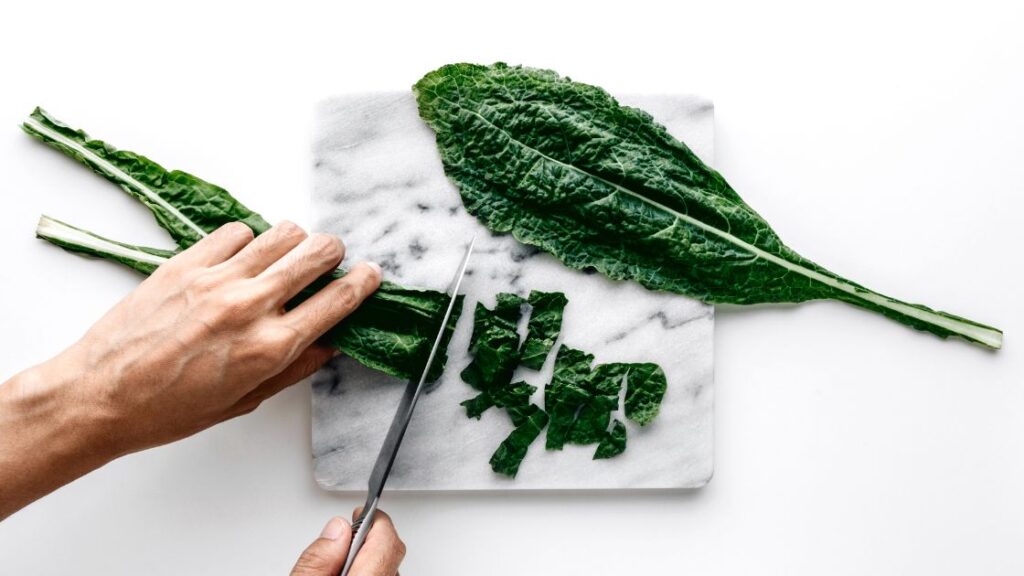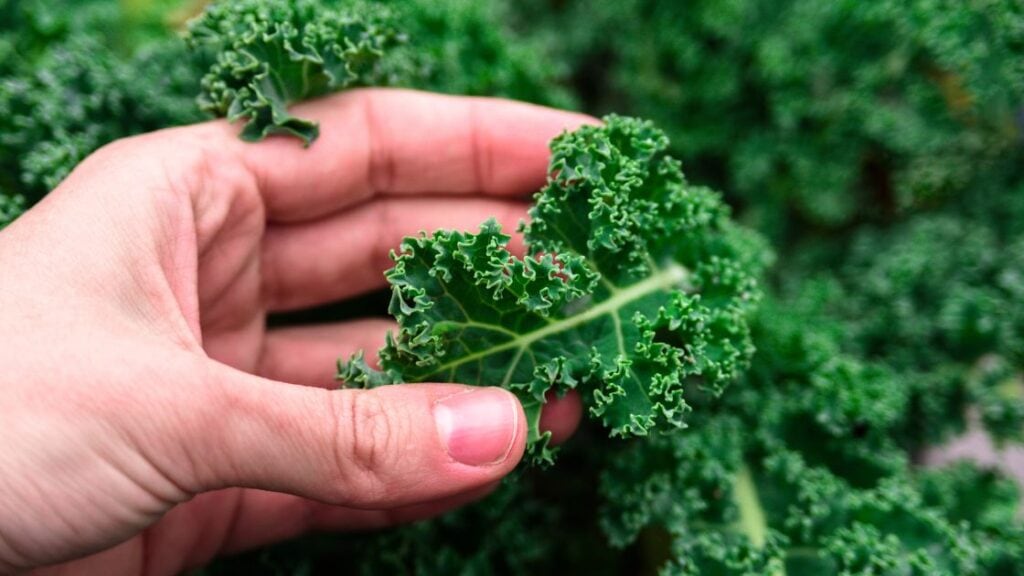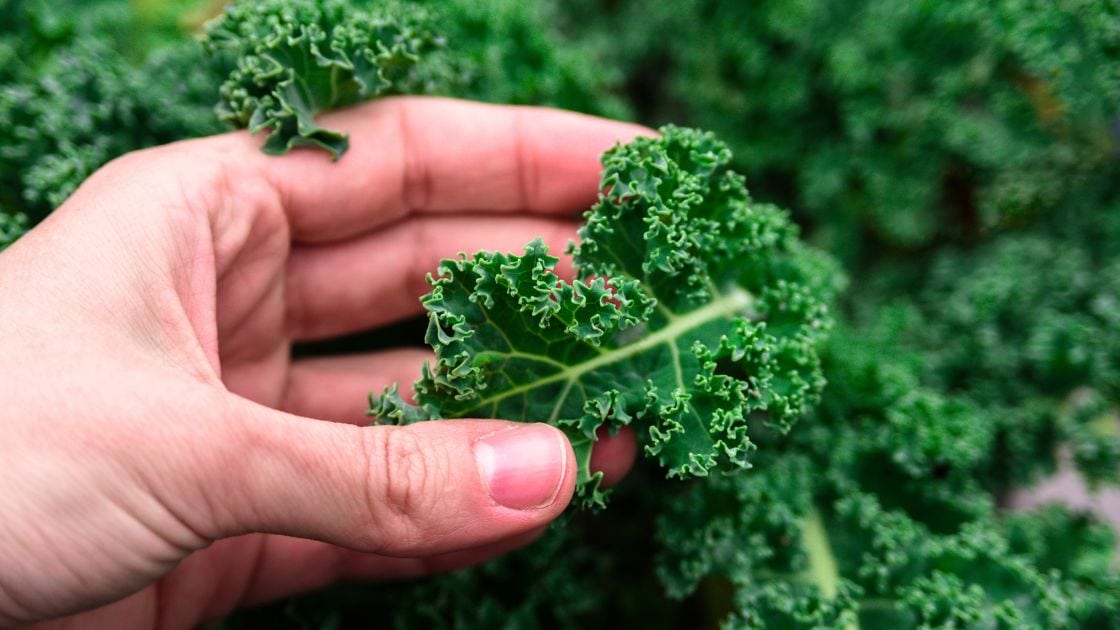- It is a nutrient-dense superfood with high levels of vitamins and minerals
- It can aid in weight loss due to its low-calorie and high-fiber content
- It can help reduce the risk of heart disease by lowering cholesterol levels
- It contains powerful antioxidants that protect against cell damage and inflammation
- It is a great source of beta-carotene and other minerals necessary for overall health
Do you know the benefits of kale?
One of the most nutritious green foods that we can consume.
It stands out among the many other green foods frequently recommended by health and nutrition professionals.
It has several nutrients that label it a “superfood.”
This leafy green vegetable is rich in vitamins, minerals, and antioxidants, classifying it as one of the greens preferred by nutritionists.
Keep reading and learn in depth the benefits that this wonderful food has to offer.
Nutritional Value of Kale
Kale is one of the most nutrient-dense foods in the world, is relatively low in calories, and is packed with vitamins and minerals.
Adding kale to your daily eating plan is a simple way to increase your preparations’ nutritional value significantly.
One cup of kale contains the following nutrients:
- 206% of the RDI (Recommended Dietary intake) of Vitamin A
- 134% of the RDI of Vitamin C
- 684% of the RDI of Vitamin K
- 10% of the RDI of Copper
- 26% of the RDI of Manganese
- 33 Calories
- 2 grams of Fiber
These amounts are in approximately 67 grams (2.4 ounces) of uncooked kale.
The Health Benefits of Kale
Kale provides a significant quantity of fiber to support regular bowel motions and is high in calcium and potassium.
It contains antioxidants that aid in preventing cell damage and may additionally aid in cancer protection.

You can rely on kale and its nutrients to support the health of your heart, immune system, and eyes.
But get to know each of its benefits in detail:
One of the foods with the most nutrients
One of the world’s most nutrient-dense foods is kale.
It is a cruciferous vegetable like broccoli, cauliflower, and Brussels sprouts and is a member of the cabbage family.
There are numerous varieties of kale.
You can choose between those with smooth or curly leaves.
They can also be green or purple.
Whichever option you choose to eat will allow you to enjoy its powerful nutrients.

Can help in weight loss
The benefits of kale for weight loss are well recognized.
This is due to its low caloric, high fiber, protein, vitamin, mineral, and high water content.
A diet high in fiber and protein contributes to weight loss.
Those are two of the most crucial nutrients to eat when losing weight.
Could help reduce the risk of heart disease
Kale also contains bile acid sequestrants, potent compounds capable of lowering overall cholesterol levels.
This can eventually result in improving your heart health.

Studies show that consuming kale juice daily for more than 10 weeks increases good cholesterol levels (HDL) and lowers bad cholesterol levels (LDL).
The bile acid binding action is much better if the kale is steamed.
Contains strong antioxidants
Kale is very high in antioxidants like quercetin and kaempferol, like blueberries and raspberries.
These natural substances, called antioxidants, support the body’s defenses against free radicals.
An imbalance between free radicals and antioxidants in your body leads to oxidative stress.
This is considered one of the main causes of aging and disease.
Quercetin and kaempferol are two antioxidants that can have a variety of positive effects on the body.
This comprises:
- Protects the heart
- Lower blood pressure
- Powerful and effective anti-inflammatory
- Has antiviral properties
- Helps fight chronic diseases such as cancer
The most effective source of beta-carotene
There is a lot of talk about the high concentrations of vitamin A present in kale, and this is totally true.
This cabbage contains beta-cartonene, an antioxidant that gives vegetables their vibrant yellow, orange, and red color.
Once consumed, beta-carotene is converted by the body into vitamin A.
Vitamin A is very important and necessary for our body.
It is in charge of helping us to have adequate vision and to maintain the health of cells and vital organs such as the heart, lungs, and kidneys.

It is a multivitamin because it is a fantastic source of minerals
Kale is rich in antioxidants, vitamins, and minerals that many people lack.
It contains magnesium, the fourth most common mineral in the body, essential for hundreds of metabolic processes.
Kale is a fantastic source of potassium, a mineral linked to lowering blood pressure and lowering the risk of heart disease.
It also contains calcium, a crucial nutrient for bone health.
Contains components that help against cancer
Cancer is characterized by uncontrolled cell development and is a disease that, unfortunately, kills many lives each year.
Fortunately, kale contains many substances that are believed to have cancer-preventing qualities.
Kale contains a chemical called sulforaphane, which has been found to help prevent the development of cancer at the molecular level.
It also has indole-3-carbinol, another compound that some studies have linked to cancer prevention.
Some studies conclude that eating cruciferous vegetables like kale can greatly reduce the risk of contracting several malignancies.
Could be good for eye health
Maybe the most typical effect of aging is a decrease in vision.
Fortunately, kale may improve eye health because it has several essential minerals influencing vision.
These two nutrients are the antioxidant carotenoids lutein and zeaxanthin.
Numerous studies have shown a significant reduction in the risk of macular degeneration and cataracts in people who consume adequate amounts of lutein and zeaxanthin.
How to prepare kale?
Kale can be prepared in several ways.
But the best way to consume it is raw to get all the nutritional benefits and not lose them when cooking.
However, if you want to increase its flavor, it is preferable to cook and season it.
Other ways to Eat kale
Kale can be made to taste delicious using several different methods:
- Tenderize it: Marinating kale can be softened and made easier to chew. Even if it is for a short period of time, in a little olive oil or lemon juice.
- In salads: Kale maintains its flavor and texture in salads; adding dressings can add a little more flavor.
- Stir-fry it: Kale chips are one of the most common ways to eat this cruciferous vegetable is to stir-fry it. This can reduce their size and make them a bit easier to eat.
Can kale be frozen?
If you want to reap the benefits of eating kale, you can choose to freeze this green food.
So, Kale can be frozen, but it is not recommended to use it after six weeks after freezing.
When preparing frozen kale, it is recommended that the kale leaves be steamed and blanched for two and a half minutes.
This should be done by covering the pot of boiling water with a lid.
After the recommended time has elapsed, let it rest at room temperature to enjoy the kale and its flavor.
So, if you want to reap the benefits of eating kale, you can choose to freeze this green food.
Include this cruciferous vegetable in your diet
You already know the benefits of kale, so be sure to include kale in your diet to consume the nutrients it provides.
If you love green foods, you will not have to make much effort to eat kale.
On the other hand, if you don’t like vegetables very much, you can try adding seasonings so that, little by little, you become familiar with their flavor.
The important thing is to consume it and take advantage of its nutritional and medicinal benefits.

I am a professional health and nutrition writer with extensive experience in the industry. My passion for sharing valuable insights on nutrition and wellness stems from over 15 years of personal training and maintaining a healthy lifestyle. My commitment to continuously educate myself on the latest trends and research in the field allows me to deliver high-quality content that is informative and engaging. My mission is to empower individuals to make informed decisions about their health and well-being through my writing.









